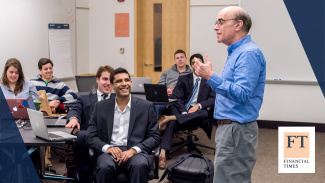Professor Erik Gordon Examines Financial Times Election Poll Results in the Classroom

In a recent Poets & Quants article, Erik Gordon, clinical assistant professor of entrepreneurial studies and strategy, discusses how he uses the Michigan Ross-Financial Times poll in his classroom. The poll measures voter sentiment about economic issues in the 2024 U.S. presidential election.
Announced in October 2023, Michigan Ross and the Financial Times are partnering on a monthly poll to track how American voters perceive financial and economic issues in the lead-up to the 2024 US presidential election. The poll is running for 12 months leading up to the election. Gordon and four additional faculty experts contribute to the questions asked of voters each month.
I thought to myself, ‘Oh wow, wouldn’t it be fun to peek at the data when it comes back and ask my students what are the ramifications of the public feeling this way?” Gordon said. “To be able to walk into the classroom, and say ‘These are numbers that were collected last week’ gets the students’ attention. It’s a good way to center the classroom around the real world.
Gordon teaches classes on Venture Capital Finance (ES 624) and Private Equity Finance (ES 623), so he presented polling results to his students and asked them how they should factor the information into their career planning. For example, the January poll stated that 57% of voters said they believe technology companies have too much power and influence. That sentiment could drive antitrust policy in the future and be impacted by who wins the 2024 presidential election.
Meanwhile, in the Wolverine Venture Fund (ES 701) course, which provides “hands-on” experience for investing in start-up companies, Gordon asked students how to interpret sentiment for electric vehicles. The March poll showed that 39% of voters are willing to consider purchasing an electric vehicle at the moment, which is contrary to the media hype around EVs. The poll data impacted the investment decisions made by the class.
They realized electric vehicles will take over and be the dominant technology, but it’s going to take a lot longer than we thought,” Gordon said. “The poll numbers got us into a real hands-on, real-world discussion of how early-stage investing works, where if you invest in the right idea at the wrong time, you can go broke.
In addition to Gordon, Sarah Miller, associate professor of business economics and public policy, and Marcus Collins, clinical assistant professor of marketing, have used statistics from the Michigan Ross-FT poll in their classrooms, which they discussed in a recent Business & Society podcast.










